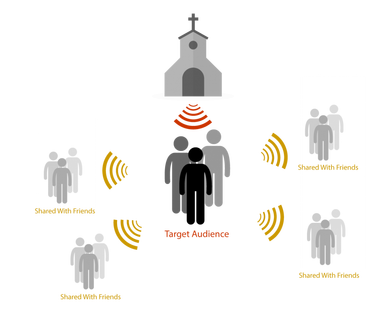 One of the most common questions I hear from church workers is: “How do you use social media effectively?” Most churches have a sense that social media is a big opportunity but don’t know how to capitalize on it. Social media can be a little intimidating for those of us who aren’t digital natives. To be clear, I’m not a social media expert by any stretch of the imagination. However, I’ve watched and learned from people and churches who use social media very effectively. So, here are some tips if you’re looking to get into or improve your church’s social media game. 1. Target Your Audience Social media savvy churches understand who they are posting for. Most likely, random people from the world at large aren’t going to be watching your church’s Facebook page or Instagram feed. It will be your people. So, as you think about as strategy for social media, it’s important to realize that this is an avenue to lead, encourage, and strengthen your core church attenders. Now, here’s where it gets interesting. Social media can be a great way to connect with people outside your church but this happens indirectly. It happens when your people repost something the church posted. When this happens, all their social media friends and followers are exposed to your church. This can be a very good thing. So, if you want to improve your church’s social media presence, narrow the focus and post content for your people. And, understand that when you post content that reminds your people how much they love their church they will likely share it. Then all their followers and friends will be exposed to your church. 2. Appoint a Point Person A second strategy that social media savvy churches employ is to appoint a point person. In a typical church, every different ministry has their own social media accounts and each ministry is posting whatever seems right in the moment. Some good can definitely come out of this but not as much good as could come out of a concentrated effort in which everyone is running in the same direction. Smart churches appoint one person. For some it is a paid position, for others it is volunteer, but this person oversees all social media at the church. This doesn’t mean that they post everything but it does mean that they are observing, directing, and consolidating posts in a way that makes sense and reflects whatever strategy a particular church has for social media. 3. Focus Have you noticed that there are a bazillion social media platforms? I mean, even before we start talking about the obscure ones, there are a bunch that it seems like everyone is on:
Actually, no. That would be terrible. Here’s what I’ve noticed. Social media savvy churches focus. I would argue that you really only need one as a church: Facebook. Facebook is still by far the most popular social media platform with American adults. Once you get Facebook off the ground, move on to Instagram. However, if you are a student ministry or very young church, reverse the order here. Start with Instagram and then move to Facebook. In our student ministry, we communicate with students through Instagram and to their parents through Facebook. Wherever you find yourself, the point is: Focus. Get good at one platform and then if necessary, move on. There’s no need to try to be active in a bunch of different social media platforms. 4. Engage and Answer Funny thing, social media is supposed to be… well, social. In other words, if you actually want your people to stay engaged with your social media accounts you need to respond to their posts, comments and questions. Even a simple, “Thanks for your comment” goes a long way in letting people know that you actually care. Quite simply, people and organizations that only post their content come across as impersonal and focused on themselves. In contrast, people and organizations that respond to comments and questions appear to be warm, personal and others-focused. This is another reason that someone must be appointed to oversee social media at your church. If the comments and questions are everyone’s responsibility, they are no one’s responsibility. 5. Tell Stories I’ll never forget a lesson I learned about recruiting volunteers a few years ago. Like you, we’ve tried every conceivable method to recruit volunteers. No matter what we tried we were always, shall we say, underwhelmed by the response. Then, one year we made a video of one of our volunteers telling the story of her experience as a small group leader of high school girls. That year, we had 5x the applicants. That’s a big difference! That’s the power of story. Social media can be an incredible tool for churches. Unfortunately, we often fail to realize the true potential. Social media savvy churches use social media to tell stories—specifically, the stories of what God is doing in the lives of people. It doesn’t have to be some expensive video that you don’t have the resources to create either. It can be a simple photo of a person with the story in text below the picture. The point is that stories captivate the heart. We were created to resonate with stories. When churches use social media to tell stories of what God is doing and invite people to join in what’s happening, beautiful things happen. 6. Be Helpful Lastly, social media savvy churches attempt to be helpful. Social media has a bad reputation for being nothing more than a tool for self-promotion. I agree that this is what social media becomes when it is at its worst. However, it doesn’t have to be. When people or churches use their social media presence to help others, it can be not only compelling but magnetic. So, here’s my final piece of advice: Don’t use your church’s social media platforms as a constant advertisement. Be creative and find ways to actually encourage and help people. I recently heard one social media expert advise that for every one post that is self-promoting, you should post four that help and serve others. The point is that people tend to tune out people and organizations (churches included) on social media that constantly promote themselves. The most savvy social media users are genuinely helpful and others focused. Next Steps If you’re looking for a place to start, I would encourage you to learn. Start following different churches’ social media accounts and take notes. What do you like, what do you hate? What is worth copying? (If helpful, you can check out our church’s Facebook page and Instagram feed). From there, pick a platform, appoint a person and get to it! Written by Aaron Buer. Article may be found at Breeze.
1 Comment
|
Where do you go to learn about being a minister's wife?
It is our desire here at Refresh to see that each woman has a positive experience in partnership with their husband in ministry. Bloom wants to provide guidance, support, connection, and encouragement to wives new to ministry through a connection with a seasoned and trained minister's wife using a Connect group created specifically for you. We'll use books to guide us in our conversations about the challenges, issues, benefits, and rewards of being a minister's wife. We believe when women are strengthen, our families and churches are strengthened, and the ministry of the gospel is strengthened. Interested in joining a Bloom Group?
Let us hear from you. Next group starting April 2018. Archives
April 2018
Categories
All
|
Proudly powered by Weebly





 RSS Feed
RSS Feed